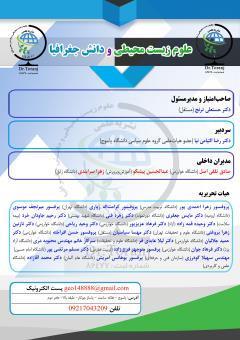بررسی مروری بر مفاهیم و مکاتب اکولوژی در صنعت گردشگری
محورهای موضوعی : علوم جغرافیا (کلیه گرایشها)
شهرام رفیعی نائینی
1
![]() ,
آتنا حرفه گر
2
,
آتنا حرفه گر
2
![]() ,
میترا حسین پور شرف شاد
3
,
میترا حسین پور شرف شاد
3
![]() ,
محبوبه جرجانی
4
,
محبوبه جرجانی
4
![]()
1 -
2 - گروه آموزشی جغرافیا، دانشکده ادبیات، علوم انسانی و اجتماعی، تهران، ایران
3 - گروه آموزشی جغرافیا، دانشکده ادبیات، علوم انسانی و اجتماعی، تهران، ایران
4 - گروه آموزشی جغرافیا، دانشکده ادبیات، علوم انسانی و اجتماعی، تهران، ایران
کلید واژه: گردشگری اکولوژیک, گردشگری پایدار, مکتب جغرافیای اکولوژیک, زیست بوم گردشگری,
چکیده مقاله :
امروزه صنعت گردشگری و هتلداری به عنوان یکی از مهم ترین محرک های ثروت و اشتغال زایی در جهان شناخته شده و موتور رشد و پیشرفت اقتصادی کشورهای توسعه یافته و در حال توسعه در صحنه جهانی به شمار می رود. اكوتوريسم به عنوان يک گونه از گردشگری قادر است که در استفاده از توانهای محيطی سبب افزايش همکاری وتاثيرات اقتصادی آن و همچنين حفاظت از محيط زيست و توسعه پايدار شده و تحرک و پويايی را در اقتصاد محلی و منطقهای به وجود آورد. هدف از پژوهش حاضر بررسی مفاهیم و مکاتب گردشگری اکولوژیک میباشد. روش تحقیق توصیفی تحلیلی و با استفاده از منابع کتابخانه ای میباشد. رابطه بین گردشگری و محیط زیست نه تنها اساسی است بلکه بسیار پیچیده است. بین این دو وابستگی متقابل وجود دارد که به آن همزیستی می گویند. به زبان ساده، این همزیستی به این معناست که گردشگری توسعه خود را مدیون محیط با کیفیت بالا است. ابعاد زیست محیطی گردشگری یکی از رشته های مورد علاقه جغرافیدانان به دلیل ماهیت جغرافیا است که رویکردی قوی به حوزه روابط انسان و محیط زیست دارد. در واقع، تأثیر زیستمحیطی گردشگری و تفریح و تجزیه و تحلیل منابع، حوزهای است که علوم انسانی و جغرافیدانان طبیعی در مطالعه موضوعات مرتبط با گردشگری با یکدیگر همپوشانی دارند. دلیل دیگر اما اهمیت محیط طبیعی برای گردشگری و تفریح است.
Today, the tourism and hospitality industry are known as one of the most important factors of wealth and job creation in the world, and it is considered as the driving engine of economic growth and progress in developed and developing countries in the world arena. The river Ecotourism as a type of tourism is capable of increasing cooperation and its economic effects in the use of environmental resources, as well as environmental protection and sustainable development, and mobility and dynamism in the local and regional economy. The purpose of this research is to investigate the concepts and schools of ecological tourism. The research method is descriptive and analytical using library resources. The relationship between tourism and the environment is not only fundamental, but also very complex. Between these two, there is mutual dependence, which is called symbiosis. This coexistence in simple language means that tourism owes its development to high quality environments. The environmental dimensions of tourism are one of geographers' favorite fields, the reason for this lies in the nature of geography, which has a strong approach in the field of human-environment relations. In fact, the effects of tourism and recreation on the environment and resource analysis is an area in which human and natural geographers have common ground in studying the problems related to tourism. However, another reason is the importance of the natural environment for tourism and recreation.
